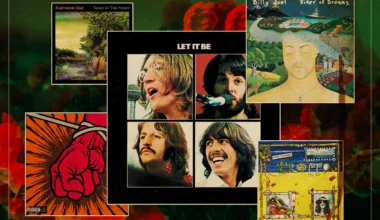Any artist is taking a gamble whenever they take a risk on their albums. The fans might love you for a very specific reason, and once they start messing with the formula, there’s no telling whether they will embrace it with open arms, start scratching their heads in confusion, or throw the album out entirely since it “betrayed” them.
Regardless of which version of Pink Floyd you listened to, though, David Gilmour was going to make sure that he never phoned it in when making a record.
Roger Waters may have been the grand conceptualist behind everything, but Gilmour was really the riff master in many respects. His voice may have been a perfect fit for Water’s words, but whenever he pulled out his lead licks, he could make any room fall silent, especially when tearing through the solos on ‘Time’ or bringing the house down every night when he performed ‘Comfortably Numb’.
But while Gilmour had some of the finest musical moments in the band’s career, he never considered himself a songwriter first. The internal chemistry worked best when Waters covered up that end of the band, and while tunes like ‘Fat Old Sun’ snuck by and were pretty great, all things considered, it was always going to be a tougher fit whenever Gilmour struck out on his own for A Momentary Lapse of Reason.
The album is definitely a step down from the genius moments that Waters had with the band, but after coming off The Final Cut, hearing an album that actually sounds optimistic is at least a little bit of a return to form. The band was back and ready to deliver their best to everyone again, but in the final version, there were many more squelchy synthesisers than many people associate with the group.
Richard Wright always used his keyboards tastefully, but Gilmour felt the band needed to remix the album to give everyone a proper look at what they had in mind, saying, “It was a moment where there was all these new technologies burgeoning throughout the 1980s. Lots of new synthesisers that we embraced rather too readily, I think in retrospect. To me, the one thing about the album that gave me pause for thought was maybe it could be made a little more timeless with instruments that we’re used to playing with.”
And when you listen to the band play the tunes live, it’s easy to see what he means by that. Not every one of the tracks was meant to be featured in a live setting by any stretch, but compared to their studio counterparts, songs like ‘Learning to Fly’, ‘Sorrow’ and ‘On the Turning Away’ sound much better when heard on the album The Delicate Sound of Thunder from their live shows around that time.
It was a bit of a misstep right out of the gate, but The Division Bell was them at least learning from their mistakes. That conceptual angle from their glory years was back by dealing with themes of communication, and songs like ‘High Hopes’ deserve to be in the same conversation with ‘Money’ and ‘Wish You Were Here’ in many respects.
If anything, most people should take comfort in knowing that Gilmour is the kind of artist who learns from his mistakes. Because if you look at the number of people who don’t and proceed to spend their entire careers falling arse over teakettle into the sunset, it’s comforting knowing that some bands can correct some of their less-admirable moments.






